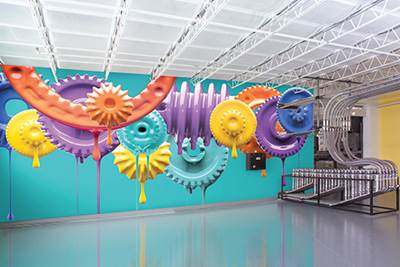Do today’s engineers know plastics?
The nationwide STEM (science technology engineering math) push means the U.S. will eventually be graduating more engineers; but will they know enough about plastics?

That question was posed to me by John Winzeler, president of Winzeler Gear, when I interviewed him for a September magazine feature on workforce development (Winzeler was featured in PT’s July On-Site). Winzeler, himself a degreed engineer and third generation manufacturer, lamented the fact that so few programs include plastics on the syllabus.
“Probably 95% of the engineering schools have no plastics in their curriculum,” Winzeler said, “yet 50% of every product out there is made of plastics.” That fact makes building out a skilled team of employees a very difficult task for companies like Winzeler.
“The whole idea of a technical workforce is an overwhelming challenge today,” Winzeler said, “and if you just look at what’s going on at school, plastics is getting like zero attention.”
Kevin Dailey, human resources director for custom molder and contract manufacturer Mack Molding’s Northern Division, also spoke with me for the article, laying out his company’s apprenticeship program and general outreach to area schools.
While he didn’t address plastics specific training in engineering schools, he did say that new grads show a general technical aptitude, admitting many of the company’s interns are “more familiar with [plastics manufacturing] than we thought.”
“We get a little bit hung up on what we do,” Dailey said. “If you’ve done it for years you really think it’s more involved than it is, but the way the engineering schools in particular are training their students these days; they’re up to speed on the latest and greatest software, they have that aptitude, intuitive mindset, where they just pick things up very quickly.”
Noel Ginsburg, president and founder of Denver based custom molder and contract manufacturer Intertech Plastics, also spoke with me about the skills gap in industry, a problem his company has aggressively attacked. While I visited, he described how Intertech was dealing with a lack of plastics training in engineering programs.
“The other day that one of our engineering interns asked if he could work here during the school year,” Ginsburg said. “The answer was yes, and then our engineering manager said, ‘and if when you graduate you’ll come to work for us, we’ll put you through some plastics specific training.’”
That’s one way to make sure future product designers work from a plastics-design-for-manufacturability viewpoint. Trained in plastics or not, we still need more engineers, and only time will tell if STEM is the means to get them.
In a 2010 presentation at the International Conference on Technology Education Research, William Dugger, emeritus professor at Virginia Tech and a senior fellow at the International Technology Education Association, laid out some sobering statistics, noting that just 4 percent of American college graduates in 2003 majored in engineering compared to 13 percent of European students and 20 percent of Asian students.
In the presentation, Dugger quoted Rodger Bybee, former chair of the Science Expert Group for the Programme for International Student Assessment:
“For a society so deeply dependent on technology and engineering, we are largely ignorant about technology and engineering concepts and processes, and we have largely ignored this incongruity in our educational system.”
Maybe we’re finally catching on.
Read Next
Winzeler Gear Thrives With a Little Help from Its Friends
Strategic partnerships give a small molder the technical clout of a much bigger firm.
Read MorePeople 4.0 – How to Get Buy-In from Your Staff for Industry 4.0 Systems
Implementing a production monitoring system as the foundation of a ‘smart factory’ is about integrating people with new technology as much as it is about integrating machines and computers. Here are tips from a company that has gone through the process.
Read More




















